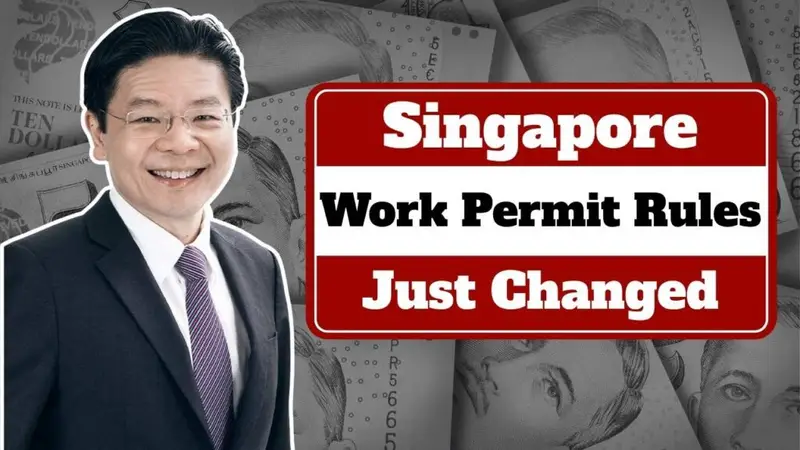Singapore has announced major changes to its work permit rules for 2025, and the updates are already making waves among foreign workers and employers. If you’re a UK citizen planning to work in Singapore or currently employed there, it’s essential to understand what these new regulations mean for you. The Ministry of Manpower (MOM) has clarified several new eligibility conditions, including salary thresholds, job classifications, and educational requirements. This article breaks down the key updates and how they may impact your future in Singapore.
New Salary Thresholds Introduced
The Singaporean government has revised the minimum salary requirements for work permit and S Pass holders to ensure that only skilled and adequately compensated workers are allowed entry. For UK professionals, the base salary required for S Pass applications has been increased from SGD 2,500 to SGD 3,150 per month. This threshold is expected to rise annually, depending on inflation and market demand.
Stricter Educational Criteria
One of the most notable changes is the stricter evaluation of educational qualifications. The Ministry will now assess foreign degree qualifications more rigorously, prioritising those from accredited institutions. UK degrees from recognised universities still qualify, but applicants will now be required to provide more comprehensive documentation, including transcripts and verification letters.
Impact On Existing Pass Holders
If you’re already working in Singapore under a valid permit, you may be wondering how these changes affect you. The good news is that existing work pass holders won’t be forced to leave immediately. However, when it’s time for renewal, the new rules will apply. That means if your salary or job designation doesn’t meet the updated criteria, your renewal may be denied.
Sector-Based Quotas And Limits
In addition to individual requirements, MOM has also introduced industry-specific quotas to limit the number of foreign workers in certain sectors. Industries like construction, manufacturing, and service sectors will see tighter limits on foreign worker intake. For British citizens seeking opportunities in high-skilled sectors such as finance, technology, and healthcare, the quota changes are less likely to be a barrier.
Changes In Dependant Pass Rules
The rules for dependant passes have also been revised. UK citizens bringing their family members along to Singapore will face stricter financial requirements. The minimum monthly salary to sponsor a spouse or child has been increased to SGD 6,000, and for parents, it’s now SGD 12,000. These changes aim to ensure that expatriates can adequately support their dependents.
New Points-Based Evaluation System
To enhance transparency, Singapore is rolling out a new points-based system called COMPASS (Complementarity Assessment Framework). This system scores applicants based on four key areas: salary, qualifications, diversity, and company support. A minimum score will be required to qualify for an S Pass. UK applicants will need to ensure that their profiles meet these benchmarks, especially in terms of salary and qualifications.
Implications For UK Employers
UK-based companies with branches or clients in Singapore must also take note. Hiring from the UK will now require more documentation, proof of skill shortage, and higher employment costs. These changes might influence recruitment decisions and talent mobility between the UK and Singapore. Employers will need to work closely with HR and immigration consultants to remain compliant.
Timeline For Implementation
The updated rules will take effect in phases starting from January 2025. By September 2025, all new applications and renewals will be fully under the new framework. This phased approach gives companies and individuals time to adjust, but early preparation is essential to avoid disruptions.
How To Stay Eligible
To stay eligible under the new rules, UK citizens should focus on upgrading their skills, obtaining verifiable academic qualifications, and ensuring that their employment terms meet the new salary thresholds. It may also be helpful to consult with immigration experts or Singapore-based employers to stay updated.
Legal And Compliance Risks
Failure to meet the new eligibility criteria can lead to application rejections, work disruptions, or even fines for employers. UK workers must ensure that all documents are authentic, verified, and submitted in a timely manner. It’s also advisable to retain all original copies of educational and professional certifications.
Final Thoughts
Singapore remains a popular destination for UK professionals due to its strategic location, high quality of life, and vibrant job market. However, with the new 2025 work permit changes, entering or continuing employment in Singapore will require careful planning and compliance. Staying informed and proactive is the best way to ensure you remain eligible under the evolving requirements.
FAQs
Is it still possible to work in Singapore with a UK degree?
Yes, but only from accredited universities. Additional verification documents may be needed.
Will the new rules affect my existing work pass?
Yes, at the time of renewal, your application will be assessed under the new rules.
What is the new salary requirement for S Pass holders?
It has been increased to SGD 3,150 per month for 2025.
Can I bring my family to Singapore under the new rules?
Yes, but you’ll need to meet the higher salary threshold for dependant passes.
When do the new rules come into effect?
The changes will be implemented gradually from January 2025 and fully enforced by September 2025.
